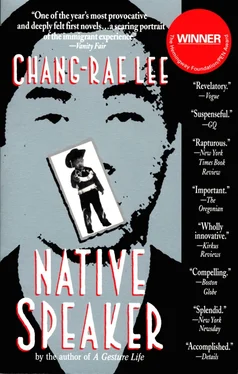* * *
Lelia and Mitt used to play around with a tape recorder I sometimes brought home from the office. It was a palm-sized model, voice-activated, that I used in the beginning for making notes to myself about work. I didn’t need to use it much later on. Mitt especially liked the microcassettes the machine used. He would peer at their miniature opaque housings, twist them around in the light, and he was always holding them up to his ear and shaking them, as if trying to rattle loose their secrets. He said to me once that these little ones could hear you even when you whispered, so that you had to be extra careful of what you said.
I knew he sometimes watched me speak into the machine. Later I saw him mimicking me; he would recline on the sofa with his little legs propped on pillows, speaking intermittently into the recorder as though he were taking drags on a cigarette. He’d talk about imaginary people in an aimless, child’s way. After a while he expertly put in another tape, pretending to mark the old one with a name or note. When he was a little older, he would actually make recordings of himself and sometimes of us, the machine being small enough that he could hide it easily. Of course I feared his perceptiveness, what he might have seen of me, or even possibly thought in his young mind.
But I knew, too, that he got the notion of being careful of what you said mostly from being with us, his father and his mother, how we were beginning to speak to one another during the course of a day with more waiting and quiet than any real noise or talk. I remember him playing in the park one weekend when he was five, tumbling as he would on the black rubber beneath the playground ladders and nets, with Lelia and me sitting on a bench a few feet away. We were arguing quietly, or at least I was. I kept looking around to make sure that the other parents couldn’t hear us. Lelia didn’t seem to care. She wasn’t yelling but her voice was clear enough that when she raised it in the crisp autumn air I thought all of downtown could hear our trouble.
We were discussing the question of another child. I knew Lelia herself wasn’t fully sold on the idea, but she kept making the argument that for her it was getting to be now or never. I told her we could have one in a few years, that she’d only be thirty-three. She argued that things can happen after a certain age. Complications. We’ll be careful, I said. And wiser, as well. Then why not wait until I’m forty, she said. We’ll be absolutely brilliant when I’m forty-five. At sixty we’ll be goddamn geniuses. I asked her not to make a scene of it, and I could see that she was about to shout out but then just as quickly she quelled herself — a trick perhaps that she had gleaned from me — and whispered sharply that if I wanted to wait I had better be willing to talk about adoption again.
Of course she knew my feelings. Adoption, I know, is a noble and mostly happy practice. No doubt an advancement for a culture. And yet for me, the prerogative is that you should still bestow your blood whenever able. You grow your own. For although your offerings of unconditional love and respect and devotion will make good of most any child, what you cannot give or else substitute is that tie unspoken and unseen, the belief in blood, that unbreakable connection telling your boy or girl that hers will never be a truly solitary life.
Mitt then shouted and ran to us, thrusting himself face first into Lelia’s chest and arms. She opened her wool coat and wrapped him up. She kissed his head. His rosy face just now untucked itself, the whole moment marsupial, strangely wondrous that way, and I thought if I had tasted a family hunger all my life that this should be my daily bread. What else is there to behold? I watched her kiss him again. But I said coldly to her anyway, “You know there’s really no chance for that.”
She didn’t say or do anything that might disturb Mitt. She was always too protective that way. She wouldn’t look at me. She just kept combing his hair with her fingers, kissing it in the spots where it was irritated with the psoriasis he often had. Sometimes he even got little patches of baldness on the back of his head, and she checked for them now, sifting through his dark brown strands with slow method. When she found one she made a tight face, touching the bare skin softly with her thumb.
“It’s not possible,” I said again.
“We’ll talk about this later,” she answered stiffly, still examining him.
“You wanted to talk before,” I pointed out to her.
“I changed my mind.”
“Well, too late.”
“ Henry ,” she said weakly. “Stop this now.”
Mitt had slipped back down into her coat, out of sight. There was some struggling inside. She unzipped her front and he bolted away immediately. He found his friends again near the concrete monkey barrels and started playing with them like he hadn’t missed a beat. Normally this would have been when Lelia started something, shook up the embers, but sitting there on the end of the bench she looked all frozen and chipped. No chance of fire. Then I didn’t know what I wanted. I got up to walk around the playground. I thought to look at all the children, the many colors of them, listen to the shouting music of their mixed-up voice, inflections of a hundred home languages. As I came back around I looked all over for Mitt. I didn’t see him. Lelia was still sitting on the bench, and this panicked me, made me angry that she wasn’t keeping a close eye on him. I felt angry with myself. Then I heard his voice among the others. I bent down to look in one of the concrete barrels on its side, and inside were Mitt and two other boys, the three of them crouched like commandos around the micro-recorder. I stepped back a little. They were too busy to notice me. He was showing them how it worked, that you turn it on and just talk, you press this button and wait and then listen. They tried this back and forth, taking turns saying things, making gun sounds, fart sounds, their yabba-dabbas, and when he rewound the tape and played it back our voices spoke instead from the hollow barrel, the tight grim interchange. Mitt said he didn’t want to play and skipped out the other end. I watched as he picked up speed and ran toward his mother, who saw him and opened wide her arms.
Now that Lelia was back from the islands for a few weeks I called her at Molly’s and I asked if I could have the tapes for a while. She took them whenever she settled somewhere semipermanently. I said I wanted to hear his voice. She was quiet and then told me she would leave them with the super downstairs. She said it was a long time since we had seen each other and that there was no sense in doing anything before the meeting we had already planned. I wondered if she realized that it was her voice, too, that I wished to hear. Her responses to our son, their laughter, the simple, ambient noise of that time. Back at the apartment I rigged the micro-recorder up to our stereo.
“Hey,” I listened to her say on a tape, “what happened to the dinosaurs Daddy gave you? You had so many in that box.”
“I think they died,” he answered. Mitt must have been three.
“How?”
“I dunno,” he said. “See my Gobot, laser guns come out of his chest and shoot. See? Pht-pht. Pht-pht-pht.”
“Swell.”
“Too bad you don’t have guns there, too, then you could shoot dumb Alex.”
“I thought Alex was your friend.”
“Nope,” Mitt answered.
“Did something happen when he came to play? You were playing, weren’t you, with the dinosaurs?”
“Uh-huh. He wanted to see them. He said dinosaurs were dumb. He said they were no-brains.”
“Well, to be honest, they weren’t very bright.”
Mitt made the shooting sound again. “Alex said they were dumb. He said his Godzilla was smart and my T-rex was dumb and had no brains so he took my bat and smashed its head.”
Читать дальше












